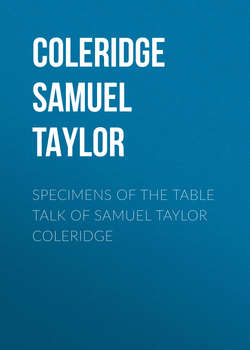Читать книгу Specimens of the Table Talk of Samuel Taylor Coleridge - Coleridge Samuel Taylor - Страница 27
TABLE TALK
July 12. 1827
ОглавлениеPOPEDOM.—SCANDERBEG.—THOMAS À BECKET.—PURE AGES OF GREEK, ITALIAN, AND ENGLISH.—LUTHER.—BAXTER.—ALGERNON SIDNEY'S STYLE.—ARIOSTO AND TASSO.– PROSE AND POETRY.—THE FATHERS.—RHENFERD.—JACOB BEHMEN
What a grand subject for a history the Popedom is! The Pope ought never to have affected temporal sway, but to have lived retired within St. Angelo, and to have trusted to the superstitious awe inspired by his character and office. He spoiled his chance when he meddled in the petty Italian politics.
* * * * *
Scanderbeg would be a very fine subject for Walter Scott; and so would Thomas à Becket, if it is not rather too much for him. It involves in essence the conflict between arms, or force, and the men of letters.
* * * * *
Observe the superior truth of language, in Greek, to Theocritus inclusively; in Latin, to the Augustan age exclusively; in Italian, to Tasso exclusively; and in English, to Taylor and Barrow inclusively.
* * * * *
Luther is, in parts, the most evangelical writer I know, after the apostles and apostolic men.
* * * * *
Pray read with great attention Baxter's Life of himself. It is an inestimable work.33 I may not unfrequently doubt Baxter's memory, or even his competence, in consequence of his particular modes of thinking; but I could almost as soon doubt the Gospel verity as his veracity.
* * * * *
I am not enough read in Puritan divinity to know the particular objections to the surplice, over and above the general prejudice against the retenta of Popery. Perhaps that was the only ground,—a foolish one enough.
In my judgment Bolingbroke's style is not in any respect equal to that of Cowley or Dryden. Read Algernon Sidney; his style reminds you as little of books as of blackguards. What a gentleman he was!
* * * * *
Burke's Essay on the Sublime and Beautiful seems to me a poor thing; and what he says upon Taste is neither profound nor accurate.
* * * * *
Well! I am for Ariosto against Tasso; though I would rather praise Aristo's poetry than his poem.
* * * * *
I wish our clever young poets would remember my homely definitions of prose and poetry; that is, prose = words in their best order;—poetry = the best words in the best order.
* * * * *
I conceive Origen, Jerome, and Augustine to be the three great fathers in respect of theology, and Basil, Gregory Nazianzen, and Chrysostom in respect of rhetoric.
* * * * *
Rhenferd possessed the immense learning and robust sense of Selden, with the acuteness and wit of Jortin.
* * * * *
Jacob Behmen remarked, that it was not wonderful that there were separate languages for England, France, Germany, &c.; but rather that there was not a different language for every degree of latitude. In confirmation of which, see the infinite variety of languages amongst the barbarous tribes of South America.
33
This, a very thick folio of the old sort, was one of Mr. Coleridge's text books for English church history. He used to say that there was no substitute for it in a course of study for a clergyman or public man, and that the modern political Dissenters, who affected to glory in Baxter as a leader, would read a bitter lecture on themselves in every page of it. In a marginal note I find Mr. C. writing thus: "Alas! in how many respects does my lot resemble Baxter's! But how much less have my bodily evils been, and yet how very much greater an impediment have I suffered them to be! But verily Baxter's labours seem miracles of supporting grace."—ED.
